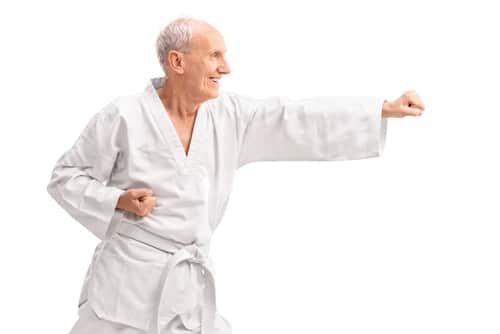Health benefits of international martial arts forms
There are many martial arts disciplines across the world, and each one provides its own set of unique benefits for your health. Not only can students gain valuable skills for self-defense and an intense workout, but they can also see advantages for their physical and mental well-being.
Here’s a look at three types of martial arts training from across the globe and how these disciplines can kick your constitution up a notch:
Karate
Karate is a martial art with roots in Japan. In English, the name translates to “open hand.”
When it comes to your health, this discipline provides two distinct benefits, among many others: improved gait and greater flexibility. For older adults in particular, age-modified karate can lead to better balance and stride. Considering the U.S. Centers for Disease Control and Prevention noted more than 1 in 4 people 65 and older experience falls each year, karate’s associated skills are a huge plus for this community.
Additionally, karate demands flexibility because of the wide stances and high kicks, which gives students a leg up on those on those who don’t practice.
Taekwondo
This discipline stems from Korea. Its name translates to “the way of the foot (tae) and fist (kwon).”
Taekwondo has marked benefits for younger students. In particular, adolescents who practice can experience a 13.6 percent boost to reaction time compared to their peers who aren’t involved in martial arts training.
Older children aren’t the only ones who have much to gain from taekwondo. Compared to nonpracticing peers, kindergarten-age taekwondo students excel at prosocial behavior and self-regulation. This is good news for parents and teachers alike.
Tai chi chuan
China is the birthplace of tai chi chuan. Its defining characteristics are slow and fluid movements.
This discipline has a variety of health benefits and is a popular choice among students of all ages. One noticeable advantage relates to respiratory health. Tai chi chuan participants can experience increased efficiency in regard to their respiratory systems’ oxygen supplies. In fact, one study published in the International Journal of Chronic Obstructive Pulmonary disease reviewed a wide breadth of previous research and determined tai chi could help chronic obstructive pulmonary disease patients exercise longer.
These are only three of a large number of disciplines potential students can enjoy. Check out a local studio to see first hand what martial arts training can do for your health.

